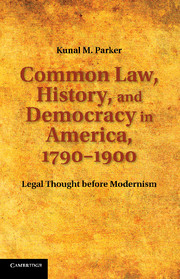2 - The Creation of Times
Custom and History in the British Background
Published online by Cambridge University Press: 03 May 2011
Summary
The Historical and the Customary: Two Legal Times
All over Western Europe, the political and religious upheavals of the sixteenth and seventeenth centuries compelled legal thinkers to reflect upon the temporality of law. When, where, and how had law arisen? If one could identify law's temporal origins, did that mean that law could be remade? If so, by whom? In pondering such questions, early modern legal thinkers accomplished a range of objectives. They bolstered or diminished the claims of nations, monarchs, popes, parliaments, and judges; reinforced or fractured the holism of medieval legal thought; and juggled multiple political, religious, legal, and intellectual constituencies. We can trace to their efforts the appearance of two distinct and powerful temporalities as ways of thinking about law: the historical and the customary.
European countries with strong Roman law traditions appear to have been at the forefront of the emerging historical thinking about law. According to Donald Kelley, the earliest modern attempts to historicize law – which began as efforts to fit bits of law into temporal context – grew out of Renaissance philology. From a deep commitment to language and rhetorical style, the fifteenth-century Italian humanist and legal scholar Lorenzo Valla sought to demonstrate how the Latin language had changed over the centuries by dating shifts in usage. In tracking linguistic and stylistic changes in Latin, and in relating such changes rigorously to legal doctrine, Valla was able to reveal the transformations that Roman law had undergone.
- Type
- Chapter
- Information
- Common Law, History, and Democracy in America, 1790–1900Legal Thought before Modernism, pp. 25 - 66Publisher: Cambridge University PressPrint publication year: 2011



